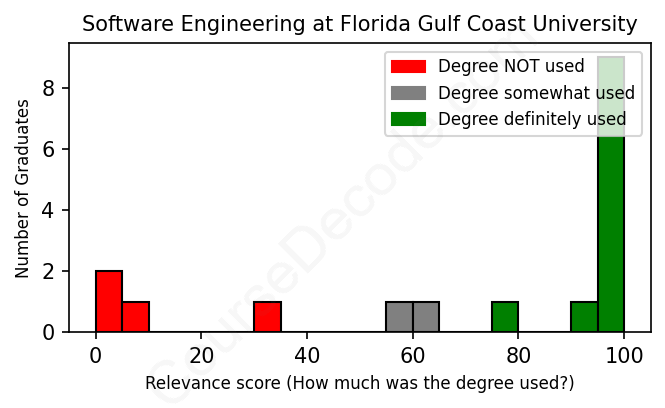
First, some facts. Of the Software Engineering graduates from Florida Gulf Coast University we've analyzed , here's how many have used (or NOT used) their degree in their career:

These are estimates based on AI analysis of 17 LinkedIn profiles (see below).
The verdict? Slightly above average. Overall, with an average relevance score of 72%, Software Engineering graduates from Florida Gulf Coast University have a slightly higher likelihood (+5%) of finding work in this field compared to the average graduate across all fields:
And for comparison, here's the chart for all profiles we've looked at across all degrees.
Also, after graduating, only 0% of these graduates have pursued further education other than another Bachelor's degree (such as a Masters degree or other), compared to the average across all profiles of 35%. This suggests a Bachelors degree is enough for most Software Engineering graduates, and it's normal to look for work straight after graduation.
See the details:
|
Relevance score: 0% We think this person has NOT gone into a career related to their degree. We think this person has NOT gone into a career related to their degree.
DEGREE INFOGraduated in 2015 from Florida Gulf Coast University with a Bachelor of Science (BS) in Software Engineering. No other secondary education since. JOB HISTORY SINCE GRADUATIONManager Java D'oro Gourmet Coffee Roasters Mar 2020 - Present ABOUTExperienced Information Technology and Software Engineer with 7+ years of experience designing, enhancing, and maintaining IT operations, including systems, servers, network, and cloud, with multiple enterprises. Strong knowledge within Windows systems, Windows server, application servers, Microsoft SQL server, Windows/Azure Active Directory, DHCP, and DNS servers. Strong information technology professional with a Bachelor of Science (BS) focused in Software Engineering from Florida Gulf Coast University. I enjoy working with others and strive to learn something new everyday. I'm always trying to find new ways to advance my knowledge of what I am currently working with as well as trying to stay current in any area of expertise, or knowledge in the field that I'm working in so that I may be able to help others with theirs. |
The top 10 most common jobs done by the graduates we've analyzed (ranked most common to least) are:
When looking through the profiles of graduates from Florida Gulf Coast University who studied Software Engineering, it's clear that many ended up in roles that fit within the tech world—specifically in software development, engineering, and some supportive roles like QA and Technical Support. You’ll find a good number of them as Software Engineers, Software Developers, or in similar positions where they’re actually using the skills they learned during their studies. But it's not all tech: several graduates veered off into unrelated or partially related jobs, like those in management in the food industry or as field technicians, which don’t really tap into the programming and software principles they studied.
Overall, it looks like while a fair amount of graduates landed jobs that are directly linked to software engineering, there’s a noticeable mix of roles that stray from that path. There are positions that use technical skills in some capacity, like IT specialists or technical support engineers, but they don't fully embrace the core of software engineering. So, while a degree in Software Engineering certainly opened doors to relevant jobs for many, there are also a good number who ventured into fields that don't make the most of their technical education. In a nutshell, it's a blend of direct application and a bit of divergence, with many finding the path of software development but others exploring less related opportunities.
Here is a visual representation of the most common words in job titles for Software Engineering graduates (this is across all Software Engineering graduates we've analyzed, not just those who went to Florida Gulf Coast University):

The graduates from Florida Gulf Coast University with a degree in Software Engineering seem to be carving out pretty solid career paths for themselves, especially when you look at their roles after graduation. Many of them have jumped into their first jobs as software engineers, software developers, or web developers shortly after finishing school. For instance, graduates from 2015 and 2016 took on roles as Software Engineers or Web Developers right away, which points toward a strong start in tech-related positions. Even those who initially worked in unrelated fields often transitioned to tech positions within a couple of years. It's clear that the skills learned in their programs are landing them roles in companies like iHeartMedia, Infosys, and Lockheed Martin—big names in the industry!
Now, looking at their five to ten-year trajectories, many of these alumni have progressed into more advanced roles or specialized positions. For example, some have moved from junior roles to architect roles or even managerial positions, which speaks to upward mobility in their careers. Graduates from 2020 and 2021 are already working as Cloud Engineers, Software Developers, and even CTOs, indicating that they've been able to leverage their early experiences quite well. Overall, while a few have taken alternative paths outside of software engineering, the majority seem to be thriving in tech-related careers, reflecting positively on the university's program. It’s a great reminder that if you're thinking about a career in software engineering, this path can really lead to exciting opportunities!
Getting a Bachelor’s degree in Software Engineering can be a bit of a mixed bag, honestly. At Florida Gulf Coast University, like many places, you'll dive into some challenging concepts like programming, algorithms, and systems design, which can definitely test your patience and problem-solving skills. It’s probably a bit tougher than average because of the technical content you’ll need to grasp and the projects that often require you to work in teams. That said, if you're passionate about tech and enjoy tackling puzzles, it can also be really rewarding and fun! Just be prepared for a good amount of coding, some late nights, and a learning curve that might feel steep at times. Overall, it’s doable, especially if you stay organized and seek help when you need it.
Most commonly, in the LinkedIn profiles we've looked at, it takes people 3 years to finish a Bachelor degree in Software Engineering.
Okay, so looking at the job paths of these FGCU grads, it seems like they're generally doing pretty well. Most of them have landed solid positions in tech, like software engineers and developers, which usually pay decent salaries, especially as they gain more experience. For example, the ones who started out as junior developers are already moving up the ranks within a couple of years. There are a few that have explored non-tech roles or have taken a bit of a winding path, but overall, it looks like they're managing to earn good money and build meaningful careers. Plus, entering the tech field right now is a smart move; there are plenty of high-paying opportunities out there! So yeah, they seem to be on the right track financially.
Here is a visual representation of the most common words seen in the "about" section of LinkedIn profiles who have a Bachelor degree in Software Engineering (this is across all Software Engineering graduates we've analyzed, not just those who went to Florida Gulf Coast University). This may or may not be useful:

Here are all colleges offering a Bachelor degree in Software Engineering (ordered by the average relevance score of their Software Engineering graduates, best to worst) where we have analyzed at least 10 of their graduates:
| College | Score | Count |
|---|---|---|
 San Jose State University San Jose State University
|
88 | 12 |
 Iowa State University Iowa State University
|
87 | 10 |
 The University of Texas at Dallas The University of Texas at Dallas
|
86 | 15 |
 Brigham Young University - Idaho Brigham Young University - Idaho
|
85 | 19 |
 Arizona State University Arizona State University
|
83 | 13 |
 Florida Gulf Coast University Florida Gulf Coast University
|
72 | 17 |
 University of Phoenix University of Phoenix
|
64 | 17 |
 Kennesaw State University Kennesaw State University
|
62 | 10 |
 Western Governors University Western Governors University
|
60 | 10 |